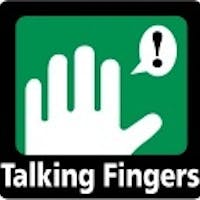Jeannine Herron, CEO of Talking Fingers, says her passion for literacy is rooted in her experiences as a civil rights activist.
Walking in the funeral march for civil rights activist Medgar Evers, in Mississippi in 1963 compelled Herron and a group of colleagues to acquire a million-dollar Head Start grant to help teach 5,000 underprivileged Mississippi children to read and write.
A brief conversation with one of the children she taught through Head Start had a major impact. Herron asked the child what she’d like to learn. The little girl’s reply was simple, "I want to learn to read and write, and then I'm going to go home and teach my daddy."
That powerful interaction struck Herron to the core, creating a deep realization of the importance of literacy. Already a teacher, she earned her PH. D in neuropsychology and began studying how the brain learns to read.
Through her education and research, Herron discovered that the whole-language approach to teaching reading wasn’t working for many students—but that taking a phonetic approach to reading instruction produced stellar results.
Despite a complete lack of experience developing software, Herron formed Talking Fingers, a company focused on developing evidence-based literacy products, including the Read, Write & Type program which is used today by 500,000 students in 33 countries around the world.
She has received five, million-dollar Small Business Innovative Research Awards (SBIR) from the National Institute of Child Health (NICHD) to develop and conduct research with these products.
The author, neuropsychologist, researcher, mother of two and CEO talked to EdSurge about the current state of literacy in America and how changing our approach to teaching literacy can positively impact students—and society as a whole.
EdSurge: What inspires you in your work?
Jeannine Herron: Originally, it was that five-year-old in Mississippi that inspired me. Currently it's the fact that we have a real reading crisis in America; 66 percent of our fourth graders are not reading proficiently. It is really appalling. America is about 17th among developed nations in reading and only 8 percent of our fourth graders can read at an advanced level. Our kids are really not learning to read well in American schools.
Why was it so important that you help kids learn to read and write?
Well, I think literacy is an extremely important way to help children learn to think critically, to be good citizens, and to participate in our democracy. I think it's essential for them to be able to sort out which information they hear or see on TV or the internet is true and which is not.
Kids who struggle to read can't read medicine bottles. They can't read bus schedules. They're very limited as citizens and also limited in economic terms in the way that they can get jobs. You need to be educated and they need to be able to read and write well.
What are some of the biggest obstacles in teaching literacy today?
One obstacle that stands in the way of changing reading nationally is the fact that educational institutions are not paying attention to the science of reading. They continue to instruct teachers to teach reading with whole words and the whole-language approach, rather than teaching them the importance of speech and how to sound out words, and then link sounds to letters rather than letters to sounds. Speech to print rather than print to speech. So we're kind of doing it backwards and I'm hoping to change that.
When I speak at conferences or do webinars or do professional development, I talk about this fact and the fact that teachers need to pay more attention to what's happening in research. Not only neuroscience research, but also cognitive research because the evidence is overwhelming that the whole-language approach isn't working.
What are some common myths about your industry, or even about your product?
One is that kids shouldn't be using computers and tablets when they're very young. I think the research shows that if kids are playing games and spending long hours at the screen, that's definitely not good for them. But if they're doing things that are well-designed and are actually teaching them things, I think it’s a wonderful, new opportunity, because children can get feedback from the software or the apps and learn independently, and be excited by the games and the animations, and so on. I think technology is a very valuable . . . and I haven't seen any research that says targeted amounts of time and targeted software are harmful in any way.
What feedback have administrators given about your product, Read, Write and Type?
Administrators have loved the product over the years and right now we're giving them an extra boost by linking with a company called Clever, which makes the job of administrators a lot easier because it's the single sign-on solution. It makes it easy for kids to go to the computer and just access the software that's for them immediately. They can even hold a card up to the computer and it will recognize their name and they don't have to sign in.
What type of impact do you hope to have on education?
I’m concerned about the youngest children in America, and how many children grow up in poverty or grow up in neighborhoods where they don’t have opportunity for good education.
I hope that we can move, in America, toward putting more funds, resources and energy into helping young children learn to talk, learn to read, learn to write and develop vocabulary. All these things are important for developing the skills that they’ll eventually need in school.
The young brain is the one that’s most rapidly developing and needs all that input. If we put resources into the very youngest of our children we could save a lot of money later dealing with reading difficulties, juvenile delinquency and a lot of social problems that result from kids not learning to read and write.



